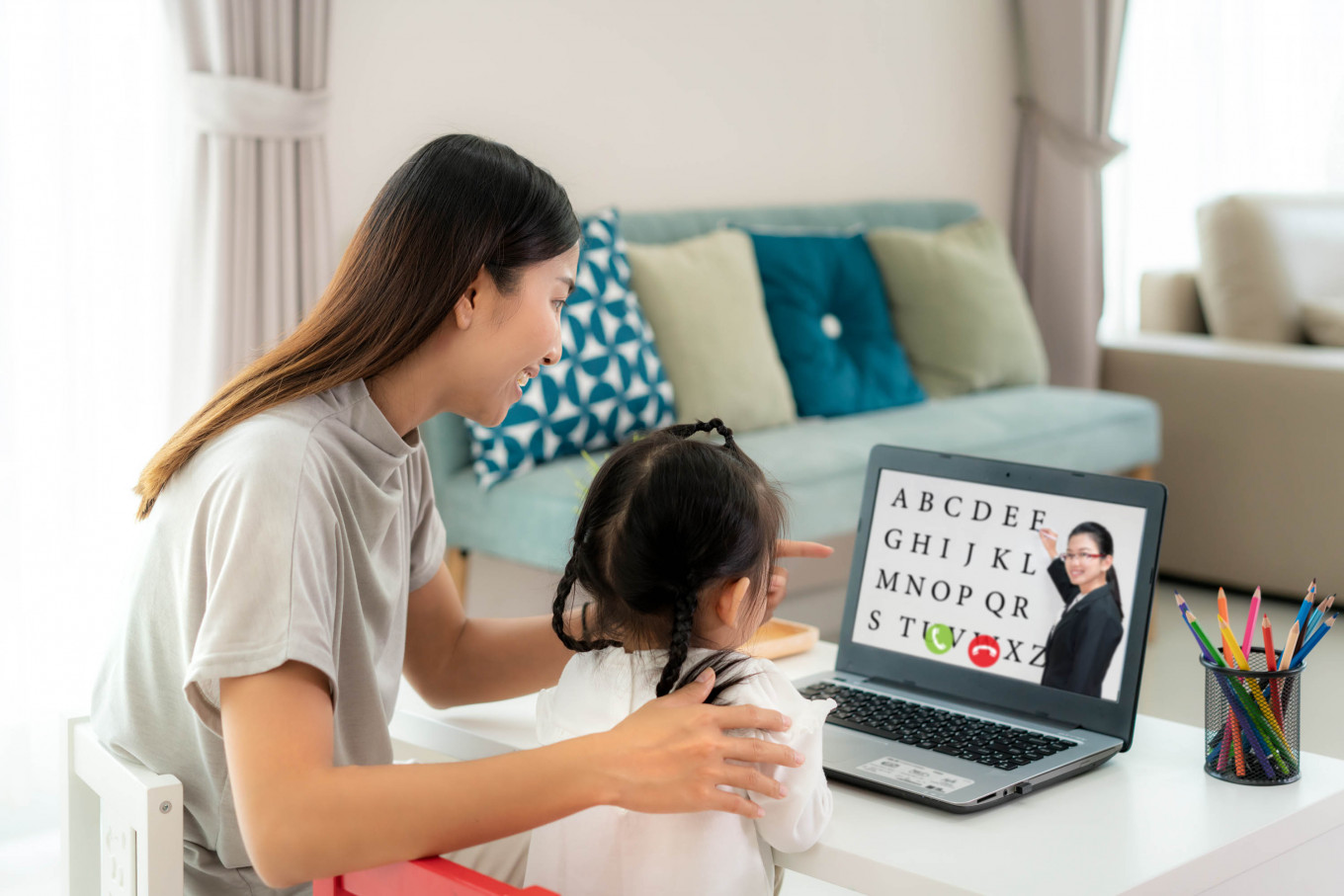Popular Reads
Top Results
Can't find what you're looking for?
View all search resultsPopular Reads
Top Results
Can't find what you're looking for?
View all search resultsWhen everyone is a teacher, every house is a school
Given that new internet users are more likely to live in rural communities, have a lower income and to be women or older people, it risks widening social and economic divides.
Change text size
Gift Premium Articles
to Anyone
F
or netizens, browsing the web or using an app comes naturally. Think back to your first brush with the internet perhaps decades ago. How did you learn to use it? Now imagine if you entered the world wide web as a brand new user today.
Indonesia’s internet users may have exponentially increased over the years, but in a country with a population of more than 270 million, there are tens of millions of people trying to get to grip on the internet for the first time.
Between now and 2025, more than 1.2 billion people around the world will go online for the first time, and more than 15 percent, or 188 million, of them live in Indonesia. Given the opportunity, these new internet users — many of whom come from rural communities — will shape the future of the internet.
But as a new white paper from Google’s Next Billion Users initiative shows, they face steep obstacles to reaching their potential.
Our study — which focused on Brazil, India, Indonesia, Nigeria and Mexico but has global relevance — found that 75 percent of new internet users relied on other people, networks of “informal teachers”, for tasks as basic as switching on their phones. These “teachers” — typically family members or friends — play an important role, especially in regional communities where technology isn’t a given. They are trusted and asked to teach over time, from setting up and maintaining accounts, to ordering everyday items online.
As one participant in our study said: "My daughter is a good teacher and explains everything in detail. She’ll teach me and then encourage me to practice, because if I don't, I'll forget." We often see in these interactions that “teachers” want their “students” to feel confident.
But ultimately, this kind of relationship isn’t a reality for everyone. The people they rely on for digital help aren’t always easily accessible (something the pandemic has made worse). Half of them don’t live with the people they’re teaching. For example, one father we spoke with would only use his phone when his son was around, every few months. This can lead to stagnation on both sides. The new internet users are not learning effectively, and the teacher isn’t able to help their students learn fast enough.
Despite the best of intentions on all sides, the current learning system leaves new internet users without important skills and places an unreasonable burden on these informal teachers. And given that new internet users are more likely to live in rural communities, to have a lower income, and to be women or older people, it risks widening social and economic divides. In an increasingly digitized world, we can minimize these risks by making sure that there is a learning system that works better for all new internet users.
It will take a collective effort from governments, business and communities to clear the hurdles for more Indonesians to progress online — starting with three clear, tangible priorities.
Firs, our own responsibility as a technology industry. We can do much more to build apps in ways that help new users learn with greater independence. A key finding of our research was that while demonstration helps, practice is critical — and the people we spoke to felt more positive about learning when they were able to explore technology for themselves to build on their informal teacher’s foundational training.
Fast progress is possible. If we make such simple steps part of the way we design technology, we can help empower new users from the first day they begin using their smartphone and add to the current learning system for them and their informal teachers.
We recently tried a new approach with Google Go — an app from Google Search tailormade for people coming online for the first time — where we added short tutorial videos to the home screen, explaining not just how the app worked, but the larger concepts behind it. Unlike traditional onboarding screens or videos, which pop up once then disappear, these videos are there permanently — helping users gain skill and confidence over time.
Second, we should step up efforts to ensure disadvantaged groups and communities aren’t left behind.
Google, Temasek and Bain & Company recently released the e-Conomy SEA Report 2020 which not only found that Indonesia’s digital economy was still growing by double digits, but that over one in three digital service consumers began using a new type of online service in response to COVID-19 -- while the same proportion of digital consumers now come from non-urban areas.
In that context, businesses, governments, and nonprofits have a responsibility to work together to give new internet users and beginners the skills and knowledge they need to navigate the internet confidently, especially during this time of economic recovery.
There’s a great promise for more partnership-based grassroots education programs to help small and medium businesses owners and Indonesians in the workforce.
The Asia Foundation’s skills training and job-matching assistance pilot program, Go Digital ASEAN program, which has trained more than 1.7 million small business owners since 2015 — is one of the many examples of how we can help Indonesia unlock its economic potential.
Finally, growing up in a family of teachers and professors, I have realized how teachers are under many types of pressure from balancing the demands of the curriculum with the different needs of children, to the burden of administrative work to finding creative ways to keep students engaged. All of this means keeping up with technology is sometimes lower in their list of priorities.
We should make empowering teachers a long-term goal, ensuring they have the support and confidence to reach digital literacy and skills, — from online safety to critical thinking.
Initiatives like Google and Bebras Gerakan Pandai, which is training 22,000 teachers in computational thinking, show the way forward. So too does Akademi Edukreator, a partnership between Kok Bisa, the Indonesian Institute of Sciences (LIPI), and the Ministry of Education and Culture, designed to help young people, teachers and professionals make high-quality, accessible educational videos on topics such as science and finance.
Understanding and mastering the internet is hard at the best of times, and all the more among the disruption of 2020. But I believe that there is no better time than now to take action, inspired by what our father of education, Ki Hadjar Dewantara, once said: “Everyone becomes a teacher, every house becomes a school”.
Together, we can help the next wave of new users build their skills, become more independent, and realize their potential.
***
The writer is country marketing director for Google Indonesia, Philippines and SEA Next Billion Users.









